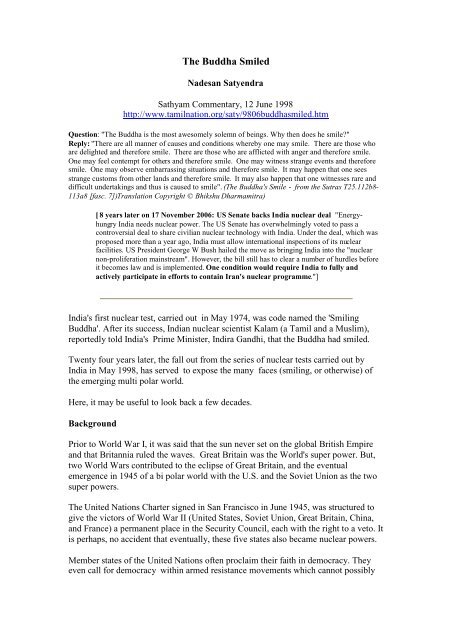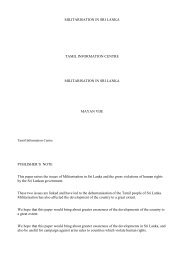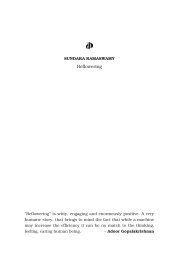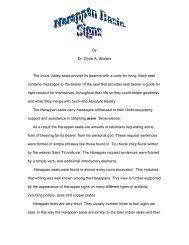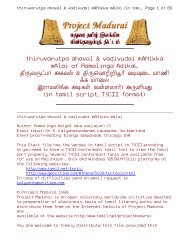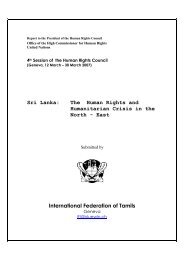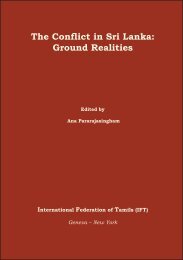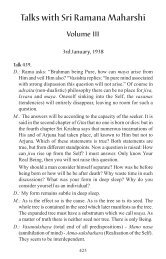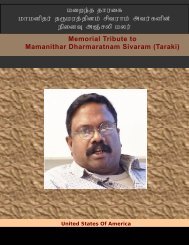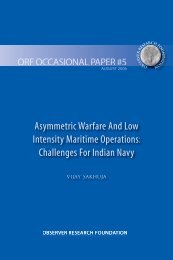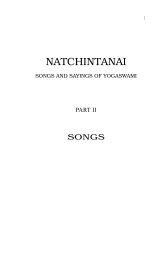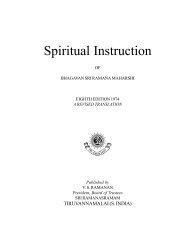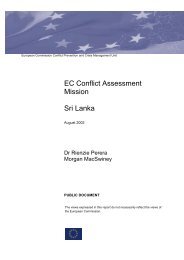in PDF - Tamil Nation & Beyond
in PDF - Tamil Nation & Beyond
in PDF - Tamil Nation & Beyond
- No tags were found...
Create successful ePaper yourself
Turn your PDF publications into a flip-book with our unique Google optimized e-Paper software.
aga<strong>in</strong>st the South African apartheid regime which had imprisoned President NelsonMandela for more than twenty years.The US po<strong>in</strong>ts out that 146 countries have signed up to the non proliferation treatyand <strong>in</strong>sists that India should 'put the brakes on its slide away from the <strong>in</strong>ternationalma<strong>in</strong>stream'. But, the US itself has not yet ratified the treaty. Furthermore, it hascarried out over a thousand nuclear tests as aga<strong>in</strong>st the five carried out by India, and atthe latest count had a stockpile of over 8000 nuclear devices - enough to destroy theearth and all its <strong>in</strong>habitants, several times over.France and Russia have deplored the Indian nuclear tests but have stopped short ofoutright condemnation and have dragged their feet at impos<strong>in</strong>g sanctions. They arenot <strong>in</strong> the bus<strong>in</strong>ess of giv<strong>in</strong>g an entirely free hand to the US to set the agenda <strong>in</strong> worldaffairs.Pakistan and Ch<strong>in</strong>a have been vociferous <strong>in</strong> their condemnation of India. BothPakistan and Ch<strong>in</strong>a are India's immediate neighbours. At the same time, each of themhave close ties with the United States. The closeness of US-Pakistan military l<strong>in</strong>kswas strengthened dur<strong>in</strong>g the Soviet - Afghanistan conflict. In the case of Ch<strong>in</strong>a, the<strong>in</strong>timacy of the relationship is shown by an example of 'co-operation' <strong>in</strong> 1979, givenby President Carter's former <strong>Nation</strong>al Security Adviser Brzez<strong>in</strong>ski. He writes:"I <strong>in</strong>formed the President that Deng (the Ch<strong>in</strong>ese leader) told Vance and me thatCh<strong>in</strong>a approved of our decision to support the Shah <strong>in</strong> Iran, that <strong>in</strong> the Ch<strong>in</strong>ese viewthe United States should be more active <strong>in</strong> strengthen<strong>in</strong>g Pakistan, and -somewhat om<strong>in</strong>ously - that Deng wished a private meet<strong>in</strong>g with the President onVietnam.I sensed from the tone <strong>in</strong> which Deng asked for this that we would be hear<strong>in</strong>gsometh<strong>in</strong>g significant, especially given mount<strong>in</strong>g <strong>in</strong>dications that the Ch<strong>in</strong>ese wouldnot sit back idly as the Vietnamese cont<strong>in</strong>ued their military occupation of Cambodia.when we sat down together <strong>in</strong> the Oval office, I had a general sense of what wascom<strong>in</strong>g...None the less, there is a difference between anticipat<strong>in</strong>g a situation and actuallyexperienc<strong>in</strong>g it. There was someth<strong>in</strong>g grave and very special <strong>in</strong> the calm, determ<strong>in</strong>edand firm way <strong>in</strong> which Deng Xiaop<strong>in</strong>g presented the Ch<strong>in</strong>ese case. Ch<strong>in</strong>a, he said, hadconcluded that it must disrupt Soviet strategic calculations and that 'we consider itnecessary to put a restra<strong>in</strong>t on the wild ambitions of the Vietnamese and to give theman appropriate limited lesson'.Without detail<strong>in</strong>g at this stage what the lesson specifically would entail, he added thatthe lesson would be limited <strong>in</strong> scope and duration. He then calmly diagnosed for usvarious possible Soviet responses, <strong>in</strong>dicat<strong>in</strong>g how Ch<strong>in</strong>a would counter them. He<strong>in</strong>cluded among the options 'the worst possibility', (a Soviet nuclear response) add<strong>in</strong>gthat even <strong>in</strong> such a case Ch<strong>in</strong>a would hold out. All he asked for was 'moral support' <strong>in</strong>the <strong>in</strong>ternational field from the United States". (Zbigniew Brzez<strong>in</strong>ski - Power andPr<strong>in</strong>ciple, published by Weidenfeld and Nicolson, 1983)
When Ch<strong>in</strong>a <strong>in</strong>vaded Vietnam <strong>in</strong> February 1979 - a twenty day <strong>in</strong>vasion to 'teachVietnam a lesson', the US stance <strong>in</strong> the <strong>in</strong>ternational arena helped to stall any adverseresolution by the Security Council on the Ch<strong>in</strong>ese <strong>in</strong>vasion.Sri Lanka’s responseAga<strong>in</strong>, unlike Ch<strong>in</strong>a and Pakistan, Sri Lanka, another neighbour of India, was quickto declare that it had no objection to India becom<strong>in</strong>g a nuclear power.Soon after the Indian General elections (<strong>in</strong> February 1998) which saw the election ofsupporters of the <strong>Tamil</strong> Eelam struggle, such as the PMK and Gopalaswamy'sMDMK to the Lok Sabha, the Sri Lankan Foreign M<strong>in</strong>ister visited New Delhi. On hisreturn, the Sri Lanka newspapers proclaimed that the Indian Prime M<strong>in</strong>ister hadassured Sri Lanka 'not to worry about <strong>Tamil</strong> Nadu.' That, ofcourse left open thequestion as to what it was that Sri Lanka should worry about.Sri Lanka would not have been unaware that the central premise of Indian foreignpolicy dur<strong>in</strong>g the past several decades has been directed to exclud<strong>in</strong>g extra regionalpowers from the Indian region. It was a policy that was promoted at the 1975 nonaligned conference <strong>in</strong> Colombo, by Sri Lanka Prime M<strong>in</strong>ister, SrimavoBandaranaike when she proposed the Indian Ocean Peace Zone.It was the election of the West lean<strong>in</strong>g Sri Lanka Prime M<strong>in</strong>ister J.R.Jayawardene <strong>in</strong>1977, and the build<strong>in</strong>g of the Voice of America <strong>in</strong>stallations <strong>in</strong> the island, whichled India's Prime M<strong>in</strong>ister Indira Gandhi to give covert assistance to the <strong>Tamil</strong>resistance movement dur<strong>in</strong>g the period upto 1984. These same considerations also<strong>in</strong>fluenced the actions of Prime M<strong>in</strong>ister Rajiv Gandhi dur<strong>in</strong>g period after theassass<strong>in</strong>ation of Indira Gandhi. The Exchange of Letters annexed to the 1987 Indo SriLanka Accord made this explicit.. Clause 2 of the letter dated 29 July 1987 from theIndian Prime M<strong>in</strong>ister Rajiv Gandhi to Sri Lanka President J.R.Jayawardene said:2. ....., you had, dur<strong>in</strong>g the course of our discussion, agreed to meet some of India'sconcerns as follows:-I) Your Excellency and myself will reach an early understand<strong>in</strong>g about the relevanceand employment of foreign military and <strong>in</strong>telligence personnel with a view toensur<strong>in</strong>g that such presences will not preJudice Indo Sri Lanka relations.II) Tr<strong>in</strong>comalee or any other ports <strong>in</strong> Sri Lanka will not be made available for militaryuse by any country <strong>in</strong> a manner prejudicial to India's <strong>in</strong>terests.III) The work of restor<strong>in</strong>g and operat<strong>in</strong>g the Tr<strong>in</strong>comalee Oil Tank will be undertakenas a jo<strong>in</strong>t operation between India and Sri Lanka.IV) Sri Lanka's agreement with foreign broadcast<strong>in</strong>g organisations will be reviewed toensure that any facilities set up by them <strong>in</strong> Sri Lanka are used solely as publicbroadcast<strong>in</strong>g facilities and not for any military or <strong>in</strong>telligence purposes.In 1998, under President Chandrika Kumaratunga's dispensation, Sri Lanka was, nodoubt, concerned to secure that there was no repetition of the events prior to 1987.
Jayanath Rajapakse, International Affairs Adviser to President ChandrikaKumaratunga declared <strong>in</strong> a recent article:"... South Asia has an advantage over others, <strong>in</strong> that regional leadership is<strong>in</strong>disputable... One test will come with the fil<strong>in</strong>g of nom<strong>in</strong>ations for permanent seats<strong>in</strong> an expanded UN Security Council - whenever that happens. India's would be theonly viable regional candidature for such a seat.... Certa<strong>in</strong>ly no other Asian candidatecould be expected to reflect South Asia's particular concerns... " ( South AsianProspect - Perceiv<strong>in</strong>g Reality - Lanka Guardian, May 1998)The decision by India, on 11 June 1998 to extend the ban on the Liberation Tigers of<strong>Tamil</strong> Eelam, for a further period, on the ground that LTTE was a threat to the unityand <strong>in</strong>tegrity of India, must have been received with some satisfaction by Sri Lanka.The US whilst, ofcourse, understand<strong>in</strong>g the special reasons which may have<strong>in</strong>fluenced Sri Lanka's decision to support India, may nevertheless have beenconcerned at the effect that such an open declaration by a signatory to the nonproliferation treaty, may have on other signatories. This may expla<strong>in</strong> the somewhatcircumspect, but po<strong>in</strong>tedly public, US response:"A US embassy official <strong>in</strong> Colombo says the American Ambassador has requested ameet<strong>in</strong>g with Sri Lanka's Foreign M<strong>in</strong>ister to learn Sri Lanka's position on India'snuclear tests. The embassy spokesperson says the ambassador is seek<strong>in</strong>g anexplanation of a foreign m<strong>in</strong>istry statement that supports India's nuclear test series -because Sri Lanka is a signatory to the Nuclear Proliferation Treaty. US embassyofficials say the United States is <strong>in</strong>terested <strong>in</strong> f<strong>in</strong>d<strong>in</strong>g out why Sri Lanka chose tosupport India so openly." (Voice of America, 19 May 1998)Sri Lanka's private response to the American Ambassador, would no doubt have taken<strong>in</strong>to account Sri Lanka's structural dependence on foreign aid. The Paris AidConsortium (<strong>in</strong>clud<strong>in</strong>g Japan), at its meet<strong>in</strong>g held on 27 May 1998, did pledge 780million dollars of aid to Sri Lanka, though the Western donors trimmed theircontribution by 10%.Here, it may be useful to remember the words of Sardar K.M.Pannikar who served as,Indian Ambassador to Ch<strong>in</strong>a from 1948 to 1952:''The public habit of judg<strong>in</strong>g the relations between states from what appears <strong>in</strong> thepapers adds to the confusion. It must be remembered that <strong>in</strong> <strong>in</strong>ternational affairsth<strong>in</strong>gs are not often what they seem to be. .. A communique which speaks of completeagreement may only mean an agreement to differ. Beh<strong>in</strong>d a smokescreen of hostilepropaganda diplomatic moves may be tak<strong>in</strong>g place <strong>in</strong>dicat<strong>in</strong>g a better understand<strong>in</strong>gof each other's position. ...'' (Sardar K.M.Pannikar - Pr<strong>in</strong>ciples and Practice ofDiplomacy,1956)Complex power balancesThe world wide web of power balances is an <strong>in</strong>creas<strong>in</strong>gly complex one. PresidentCarter's <strong>Nation</strong>al Security Adviser, Zbigniew Brzez<strong>in</strong>ski wrote perceptively <strong>in</strong> 1983::
".... The population of the world by the end of this century will have grown to some 6billion people.... moreover most of the <strong>in</strong>crease will be concentrated <strong>in</strong> the poorerparts of the world, with 85% of the world's population by the end of this centuryliv<strong>in</strong>g <strong>in</strong> Africa, Lat<strong>in</strong> America and the poorer parts of Asia....Most of the third world countries... are likely to cont<strong>in</strong>ue to suffer from weakeconomies and <strong>in</strong>efficient government, while their <strong>in</strong>creas<strong>in</strong>gly literate, politicallyawakened, but restless masses will be more and more susceptible to demagogicmobilisation on behalf of political movements... it is almost a certa<strong>in</strong>ty that an<strong>in</strong>creas<strong>in</strong>g number of third world states will come to possess nuclear weapons.... . theproblems confront<strong>in</strong>g Wash<strong>in</strong>gton <strong>in</strong> assur<strong>in</strong>g US national security will become<strong>in</strong>creas<strong>in</strong>gly complex..." (Zbigniew Brzez<strong>in</strong>ski - Power and Pr<strong>in</strong>ciple, published byWeidenfeld and Nicolson, 1983)It is not clear whether Brzez<strong>in</strong>ski saw the irony <strong>in</strong> his statement that as the peoples ofthe third world become '<strong>in</strong>creas<strong>in</strong>gly literate' and 'politically awakened' they will be'more and more susceptible to demagogic mobilisation'. Surely, literacy and politicalawaken<strong>in</strong>g will render people not more but less susceptible to demagogy.Be that as it may, Brzez<strong>in</strong>ski's perception that the political awaken<strong>in</strong>g of the so called'third world' (<strong>in</strong> reality, the 'majority world') was a threat to US 'national security'though understandable, also reflects a failure by the US to develop a pr<strong>in</strong>ciplecentred approach to <strong>in</strong>ternational relations - a pr<strong>in</strong>ciple centred approach which seeksgenu<strong>in</strong>e w<strong>in</strong>-w<strong>in</strong> answers to conflicts between the US and other states, <strong>in</strong>stead of theUS be<strong>in</strong>g seen as attempt<strong>in</strong>g to impose its own diktat on the world.In the context of an '<strong>in</strong>creas<strong>in</strong>gly literate' and 'politically awakened' multi polarworld, the old techniques of 'balance of power', 'divide and rule' and 'my enemy'sneighbour is my friend' may be seen for what they are - techniques designed simplyto out wit your opponent. And, they may not work. No one has a monopoly of wit.Aga<strong>in</strong>, as Sardar K.M.Pannikar, has po<strong>in</strong>ted out:''Foreign M<strong>in</strong>isters and diplomats presumably understand the permanent <strong>in</strong>terests oftheir country.. But no one can foresee clearly the effects of even very simple facts asthey perta<strong>in</strong> to the future. The Rajah of Coch<strong>in</strong> who <strong>in</strong> his resentment aga<strong>in</strong>st theZamor<strong>in</strong> permitted the Portuguese to establish a trad<strong>in</strong>g station <strong>in</strong> his territories couldnot foresee that thereby he had <strong>in</strong>troduced <strong>in</strong>to India someth<strong>in</strong>g which was to alter thecourse of history. Nor could the German authorities, who, <strong>in</strong> their anxiety to createconfusion and chaos <strong>in</strong> Russia, permitted a sealed tra<strong>in</strong> to take Len<strong>in</strong> and hisassociates across German territory, have foreseen what forces they were unleash<strong>in</strong>g.To them the necessity of the moment was an utter breakdown of Russian resistanceand to send Len<strong>in</strong> there seemed a superior act of wisdom...'' (Sardar K.M.Pannikar -Pr<strong>in</strong>ciples and Practice of Diplomacy,1956)The danger is that <strong>in</strong> a nuclear world, a miscalculation may result <strong>in</strong> mutually assureddestruction. It was Arthur Koestler who remarked <strong>in</strong> the 1950s that if he was asked:what was the most important date <strong>in</strong> history, he would say without hesitation that itwas the day when the Hiroshima bomb was dropped, because on that day mank<strong>in</strong>dhad for the first time acquired the know-how to annihilate the entirety of the humanspecies.
Need for Pr<strong>in</strong>ciple Centred ApproachesThe old style 'command - control' method of leadership will yield dim<strong>in</strong>ish<strong>in</strong>g returns<strong>in</strong> an <strong>in</strong>creas<strong>in</strong>gly 'politically awakened' world. Hierarchical authority may secure ameasure of compliance <strong>in</strong> the short term but it will fail to foster genu<strong>in</strong>e commitmentand stability. Perhaps, the time has come for the US government, as a government ofa country that is regarded as the home of private enterprise, to itself start practis<strong>in</strong>gsome of the leadership methods which the likes of Stephen Covey and Peter Sengehave advocated to successful Fortune 500 companies:"From a very early age, we are taught to break apart problems, to fragment the world.This apparently makes complex tasks and subjects more manageable, but we pay ahidden, enormous price. We can no longer see the consequences of our actions; welose our <strong>in</strong>tr<strong>in</strong>sic sense of connection to a larger whole. When we then try to 'see thebigger picture', we try to reassemble the fragments <strong>in</strong> our m<strong>in</strong>ds, to list and organiseall the pieces. But as physicist David Bohm says, the task is futile - similar to try<strong>in</strong>g toreassemble the fragments of a broken mirror to see a true reflection. Thus, after awhile we give up try<strong>in</strong>g to see the whole altogether.....When we give up this illusion (that the world is created of separate, unrelatedforces) - we can then build 'learn<strong>in</strong>g organisations,' organisations where peoplecont<strong>in</strong>ually expand their capacity to create the results they truly desire, where new andexpansive patterns of th<strong>in</strong>k<strong>in</strong>g are nurtured, where collective aspiration is set free, andwhere people are cont<strong>in</strong>ually learn<strong>in</strong>g how to learn together." (The Fifth Discipl<strong>in</strong>e :The Art and Practice of the Learn<strong>in</strong>g Organization - Peter M. Senge, MassachusettsInstitute Technology)There may be a need to see the bigger picture. If the US aspires to world leadership, itwill need to recognise that leadership will not come simply by the display of militarymight and economic power. It is the marriage of power with pr<strong>in</strong>ciple that will secureleadership. A leader needs to secure the trust and respect of those whom he seeks tolead - trust <strong>in</strong> his <strong>in</strong>tegrity and respect for the skills that he is able to br<strong>in</strong>g to the taskof achiev<strong>in</strong>g shared goals. This is true of <strong>in</strong>dividuals. It is true of bus<strong>in</strong>essorganisations. It is also true of countries.The glar<strong>in</strong>g weakness <strong>in</strong> the US stand on nuclear non proliferation is that it is notwill<strong>in</strong>g to engage <strong>in</strong> discussions about the reduction of nuclear weapon stockpiles as apart of an agreement on nuclear non-proliferation. It is an approach that says: "Wewill cont<strong>in</strong>ue to have, what we have. But no one else shall have, what we have."The US argument that 'the Indian government at this po<strong>in</strong>t appears to care more fornarrow political <strong>in</strong>terests, than for its role <strong>in</strong> the <strong>in</strong>ternational community."(Rediffusion News Report, 16 May 1998) would have carried more weight, if it wasnot self evident that the US stand was itself directed to secure that which the USperceives to be its own 'national security' <strong>in</strong>terests.Noth<strong>in</strong>g is ga<strong>in</strong>ed by the visceral language that some US commentators have used:"In some of the sharpest commentary heard so far, former Under Secretary of StateLawrence Eagleburger did not want "pipsqueak countries" like India to be recognised
as nuclear powers. His colleague Robert McFarlane was even more visceral <strong>in</strong> theNew York Times. 'We must make clear to the Indian Government that it is today whatit was two weeks ago, an arrogant, over reach<strong>in</strong>g cabal that, by its devotion to thecaste system, the political and economic disenfranchisement of its people and itsreligious <strong>in</strong>tolerance, is unworthy of membership <strong>in</strong> any club" (Indian Express 31May 1998)The comments by ex President Carter which appeal to reason and pr<strong>in</strong>ciple deservethe attention of a wider audience." 'It's hard for us to tell India you cannot have a nuclear device when we keep ours --8,000 or so -- and are not ready to reduce them yet," he (ex President Carter) saiddur<strong>in</strong>g a commencement address at Tr<strong>in</strong>ity College <strong>in</strong> Hartford yesterday. The U.Spolicy on nuclear weapons and landm<strong>in</strong>es "smacks of hypocrisy," Carter noted. Theformer President also po<strong>in</strong>ted out that U.S advises India to sign the ComprehensiveTest Ban Treaty but it has not ratified it yet. Condemn<strong>in</strong>g the superpower's claim toreduce nuclear arsenals, he said, "the Start-II treaty was passed about eight years agoand has still not been ratified by the U.S or Russia." (PTI, 18 May 1998)Aga<strong>in</strong>, there are those who take the view that India's nuclear tests moves India awayfrom Gandhi. The logic of such a viewpo<strong>in</strong>t may also lead them to call upon India(with the fourth largest army <strong>in</strong> the world) to abandon its conventional armed forcesas well.Here, the story of the wander<strong>in</strong>g sadhu (holy man) who visited an Indian villagewhere many had died as a result of be<strong>in</strong>g bitten by a snake, comes to m<strong>in</strong>d. As thestory goes, the sadhu advised the snake aga<strong>in</strong>st kill<strong>in</strong>g and persuaded the snake togive up its evil habits. An year later, the sadhu returned to the village to f<strong>in</strong>d the snakeshrivelled up and <strong>in</strong> agony and pa<strong>in</strong> as a result of the <strong>in</strong>juries caused by stonesthrown by villagers who were no longer afraid of it. The snake told the sadhu: " Ifollowed your advice - and see what has happened to me." The sadhu replied: "I toldyou not to bite - but I did not tell you, not to hiss."David Landes has analysed the First World's phenomenal wealth and power, <strong>in</strong> a newbook titled 'The Wealth and Poverty of <strong>Nation</strong>s : Why Some Are So Rich and SomeSo Poor ' Landes suggests that one of the three ma<strong>in</strong> reasons that Europe earned itswealth was that Europeans mastered the power to kill. They learnt about gun powderfrom Asia - Ch<strong>in</strong>a orig<strong>in</strong>ally - but they learnt to make it better and their guns firedstraighter and farther. Perhaps the time has now come to level the play<strong>in</strong>g field, toright the balance - and at the same time, move towards a world wide reduction <strong>in</strong>nuclear and conventional weapons of destruction.India’s strength will lie not <strong>in</strong> the nuclear bomb, but <strong>in</strong> its peoplesHav<strong>in</strong>g said that, New Delhi will need to recognise that, <strong>in</strong> the end, the strength ofIndia will lie not <strong>in</strong> the nuclear bomb, but <strong>in</strong> its peoples. The economy of India willnot grow unless the different peoples of India are energised to work together toachieve their shared aspirations. Here, the failure of successive Indian governments toopenly recognise that India is a multi-national state, has served to weaken the IndianUnion rather than strengthen it. The European Union (established albeit, after two
World Wars), may serve as a po<strong>in</strong>ter to that which may have to be achieved <strong>in</strong> theIndian region <strong>in</strong> the years to come. There may be a need for India to recognise theforce of reason <strong>in</strong> that which Pramatha Chauduri declared more than 70 years ago:"It is not a bad th<strong>in</strong>g to try and weld many <strong>in</strong>to one but to jumble them all up isdangerous, because the only way we can do that is by force. If you say that this doesnot apply to India, the reply is that if self determ<strong>in</strong>ation is not suited to us, then it isnot suited at all to Europe. No people <strong>in</strong> Europe are as different, one from another, asour people. There is not that much difference between England and Holland as thereis between Madras and Bengal. Even France and Germany are not that far apart. Ifsome of our politicians shudder at the mention of prov<strong>in</strong>cial patriotism, it is becausetheir beliefs smack of narrow national selfishness....To be united due to outside pressure and to unite through mutual regard are not thesame. Just as there is a difference between the gett<strong>in</strong>g together of five convicts <strong>in</strong> ajail and between five free men, so the Congress union of the various nations of Indiaand tomorrow's l<strong>in</strong>k between the peoples of a free country will be very different.Indian patriotism will then be built on the foundation of prov<strong>in</strong>cial patriotism, not just<strong>in</strong> words but <strong>in</strong> reality."Nuclear capability will not guarantee unity. The nuclear bomb did not prevent thedis<strong>in</strong>tegration of the Soviet Union and the emergence of the non-nuclear states ofLatvia, Estonia and Georgia. Peoples speak<strong>in</strong>g different languages, trac<strong>in</strong>g their rootsto different orig<strong>in</strong>s, and liv<strong>in</strong>g <strong>in</strong> relatively well def<strong>in</strong>ed and separate geographicalareas, do not easily 'melt'. And <strong>in</strong> any event, a 'third world' economy will not providea large enough 'pot' for the 'melt<strong>in</strong>g' to take place.A people's struggle for freedom is also a nuclear energy and the Fourth World is apart of today's endur<strong>in</strong>g political reality. India may need to adopt a more 'pr<strong>in</strong>ciplecentred' approach towards struggles for self determ<strong>in</strong>ation <strong>in</strong> the Indian region. Amyopic approach, apart from anyth<strong>in</strong>g else, may well encourage the very outside'pressures' which New Delhi seeks to exclude. And, if India can grasp this, then, theBuddha may have cause to truly smile.


